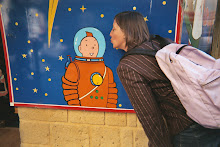It appears to me that Luisa is a common feminine name in Sena. It sounds pretty in Portuguese, especially when you put Dona (“Madame”) in front of it. Try saying it a few times, “Dona Luisa.” Pretty as it sounds, life for anyone, even a Dona Luisa, is tough here.
Let me tell you about the first Dona Luisa that I met. She’s the nurse on the project and has a strong, slim frame, short cropped hair and high cheekbones. She sees patients throughout the day and often refers them to the local health clinic for HIV testing. She keeps a log of patients and their HIV status so the project activists (lay health workers) can follow through on treatment adherence and home based care services. I don’t know if she has a husband or children, but I think she probably does. Basic medical services are lacking in Sena so this Luisa is an important conduit to care in the community. She also has some wicked dance steps that I witnessed one evening as I gathered in a circle with other project staff and danced the night away.
The second Dona Luisa I met was actually with the first Luisa. She was a client of the project seeking treatment at the local health clinic for the late stages of AIDS. I’ve never seen someone so near death from AIDS. Trust me, it was difficult to see. It was obvious that this Dona Luisa had been beautiful and was still in what should have been her prime years. However, AIDS had ravaged her frame to a thinness that looked extremely fragile. Her eyes were gaunt, her throat was white with thrush, and a sexually transmitted disease had produced cankerous sores on her most private areas. I only know this because she asked the others to leave the room so she could show me and the project director her suffering. Her sister was caring for her in the clinic as is the custom in Africa, but her husband had abandoned her after realizing she was dying. A couple of her children came to say “goodbye.” I asked if there was morphine to ease her pain, but discovered there was not even a Tylenol. I wished my touch could do more than show my acknowledgement of her deep suffering. She died later that week, and I can’t help but think that this was a blessing. I ask myself how she became infected, whether she was tested in the early or late stages of HIV, and why she had to suffer so much.
The third Dona Luisa was a maid at my little hotel. Before I talk about her, I must tell you that this is the finest hotel in Sena, but the worst hotel I have ever stayed in my entire life. It is brightly decorated with slogans to advertise the local cell phone carrier MCell and has a center courtyard where the proprietor’s goats and dogs live. The room itself is more like a cell than a bedroom because it literally has no windows. The toilet, sink and shower taunt you about better days when there was running water. Lately, women and children ride their bicycles or walk with their jerry cans full of water to fill the barrel from where all water comes. The air conditioning in the room cancelled out all other faults. I would trade running water for ac any day in Sena. It was unfortunate that the hottest day there (about 125 degrees) the electricity went out, and I baked overnight with mosquitoes blistering my flesh. Dona Luisa #3 is beautiful and young. She wears a pink checked outfit like the other maids and seems to have a limited amount of work because the place is never full. Still, she comes every morning about 5 am with the other maids and hollers loudly outside my room about what, I don’t know. This Luisa is probably my daughter’s age, but with a life that many young women could never imagine. Is she educated? Will she marry soon? Will she be a first or second wife?
All in all, I believe the three Luisas are beautiful, strong, courageous women.
Subscribe to:
Post Comments (Atom)

No comments:
Post a Comment